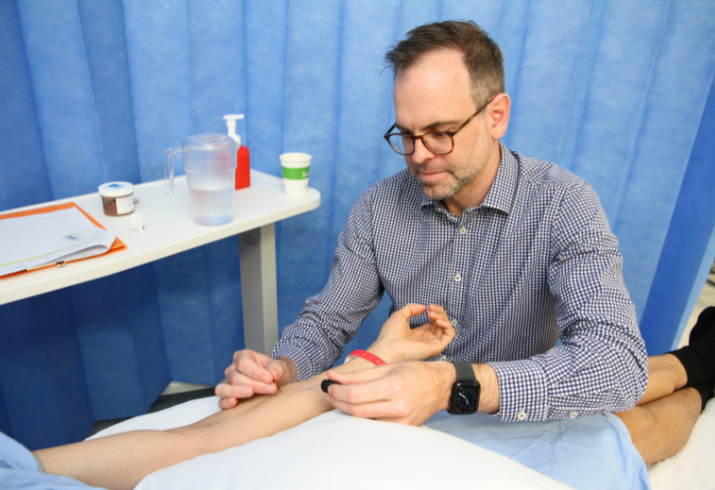Ronald hoping to benefit from FSH ACCELERATE peanut allergy trial
 FSH Consultant Clinical Immunologist Dr Michael O’Sullivan
FSH Consultant Clinical Immunologist Dr Michael O’Sullivan
For Ronald, a lifelong peanut allergy has restricted his ability to eat out, take protein powders to assist his gym work and even partake in his dream of attending the defence force.
"Peanut exposure impacts my ability to breathe so I have carried an EpiPen since I was a child and have to be really careful when I eat," Ronald said.
But thanks to his participation in the Fiona Stanley Hospital (FSH) led ‘ACCELERATE Peanut’ Study trial, Ronald may be eligible to receive IGNX001, an injectable, allergen-specific antibody medicine that targets peanut protein to provide protection against an allergic reaction.
The Phase 1 trial will assess if IGNX001 can help ease allergic reactions that might happen after accidental peanut exposure for patients like Ronald. It will monitor the safety of IGNX001, track how participants respond to it, and explore whether participants improve their tolerance to peanut protein exposure after receiving IGNX001.
Dr Michael O'Sullivan, Consultant Clinical Immunologist at FSH, is the lead investigator of the ACCELERATE Peanut trial and said IGNX001 marks a potentially major step forward in treating peanut allergies worldwide.
"There is an increasing number of people living with peanut allergy, who carry the burden of an ever-present risk of potentially life-threatening allergic reactions that can impact on their physical, social, emotional and psychological wellbeing," Dr O'Sullivan said.
"Additionally, most people with peanut allergy never outgrow it, so there is an urgent need for treatment options to provide protection against allergic reactions such as Ronald's anaphylaxis."
By using cutting edge research to re-engineer harmful IgE antibodies to IgG4 blocking antibodies that bind to allergens without causing reactions, Dr O'Sullivan said this approach offers the potential for a faster, more effective alternative to current therapies.
"This innovative approach to de-sensitisation could transform the management of patients with peanut allergy, dramatically reducing their risk of anaphylaxis and need for emergency treatment with adrenaline, in turn reducing food allergy anxiety and improving quality of life."
The Phase 1 trial is now recruiting; if you, your teenage child or someone you know would like to participate, register (external site) your interest. The trial runs for up to 6 months and involves visits to the study centre, receiving up to four injections, and undertaking a series of tests and health assessments to monitor health during the study.
For more information, visit ACCELERATE Peanut Study (external site) or email FSH immunology research.
Co-collaborating sites of the trial are Monash Health (Clayton, Victoria), Royal Melbourne Hospital and St Vincent’s Hospital Sydney. This study has been funded by IgGenix.
Keep up to date with our news and achievements
Find out more on Facebook (external site) or LinkedIn (external site)

